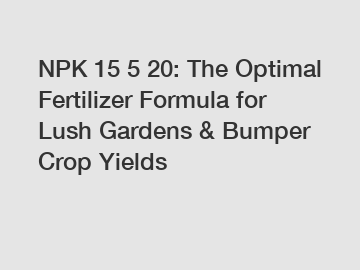NPK 15 5 20: The Optimal Fertilizer Formula for Lush Gardens & Bumper Crop Yields
Google Hot Topics: NPK 15 5 20: The Optimal Fertilizer Formula for Lush Gardens & Bumper Crop Yields?
NPK 15 5 20: The Optimal Fertilizer Formula for Lush Gardens & Bumper Crop Yields?
Are you looking to transform your garden into a vibrant oasis, bursting with healthy plants and yielding an abundant harvest? The secret lies in finding the optimal fertilizer formula, and a popular choice among gardeners is NPK 15 5 20. In this article, we will explore the reasons why this specific ratio has gained popularity and how it can benefit your plants. So, let's delve into the world of NPK fertilizers and discover if NPK 15 5 20 is the key to achieving lush gardens and bumper crop yields.

1. Understanding NPK ratios.
NPK ratios, also known as fertilizer analysis, indicate the percentages of nitrogen (N), phosphorus (P), and potassium (K) present in a particular fertilizer. These three essential nutrients play vital roles in plant growth, development, and overall health. While nitrogen promotes leafy growth, phosphorus supports root development and flower production. Potassium, on the other hand, aids in disease resistance, water regulation, and overall strength.
2. NPK 15 5 20 in focus.
The NPK 15 5 20 ratio consists of 15% nitrogen, 5% phosphorous, and 20% potassium. This specific combination, although not the only one available, has proven to be successful for many gardeners. Let's explore the reasons behind its popularity.
3. Nitrogen for lush growth.
The high nitrogen content in NPK 15 5 20 encourages lush and vigorous growth. Nitrogen is a crucial element for the formation of chlorophyll, the pigment responsible for photosynthesis. It promotes the development of lush green leaves, ensuring your plants look healthy and vibrant.
4. Phosphorus for strong roots and blooms.
The phosphorus percentage in NPK 15 5 20 supports root growth, ensuring your plants establish themselves firmly in the soil. Strong roots enable better nutrient uptake and water absorption, creating the foundation for healthy plants. Additionally, phosphorus plays a vital role in flower production. If you're looking to enhance the blooming of your plants, this ratio can be highly beneficial.
5. Potassium for overall plant health.
Potassium, represented by the last number in the NPK ratio, is responsible for several essential functions in plants. It helps regulate water movement within cells, improving drought tolerance and reducing the risk of wilting. Potassium also aids in photosynthesis, strengthens plant tissues, and enhances disease resistance. By including NPK 15 5 20 in your garden routine, you can provide your plants with the necessary potassium levels for optimal growth and defense against stressors.
6. Achieving bumper crop yields.
A well-balanced NPK ratio, such as 15 5 20, allows plants to thrive and produce high yields. The right combination of nutrients ensures that your plants have access to the necessary building blocks for growth and productivity. The nitrogen promotes lush foliage, the phosphorous strengthens roots and flowers, while the potassium supports overall health and disease resistance. By providing your plants with NPK 15 5 20, you optimize their potential for bumper crop yields.
In conclusion, NPK 15 5 20 can indeed be considered an optimal fertilizer formula for lush gardens and bumper crop yields. The balanced combination of nitrogen, phosphorus, and potassium provides the necessary nutrients for healthy plant growth, strong roots, abundant flowers, and overall plant vigor. However, it is important to note that different plants have varying nutrient requirements, so it's always advisable to consult specific guidelines for your plant species. Give your garden the boost it deserves and try NPK 15 5 20 to witness the transformation in your plants' vitality and productivity.
Are you interested in learning more about npk 10-52-10+te, Diammonium Phosphate Fertilizer Manufacturer, Muriate of Potassium granular 60% K2O? Contact us today to secure an expert consultation!


